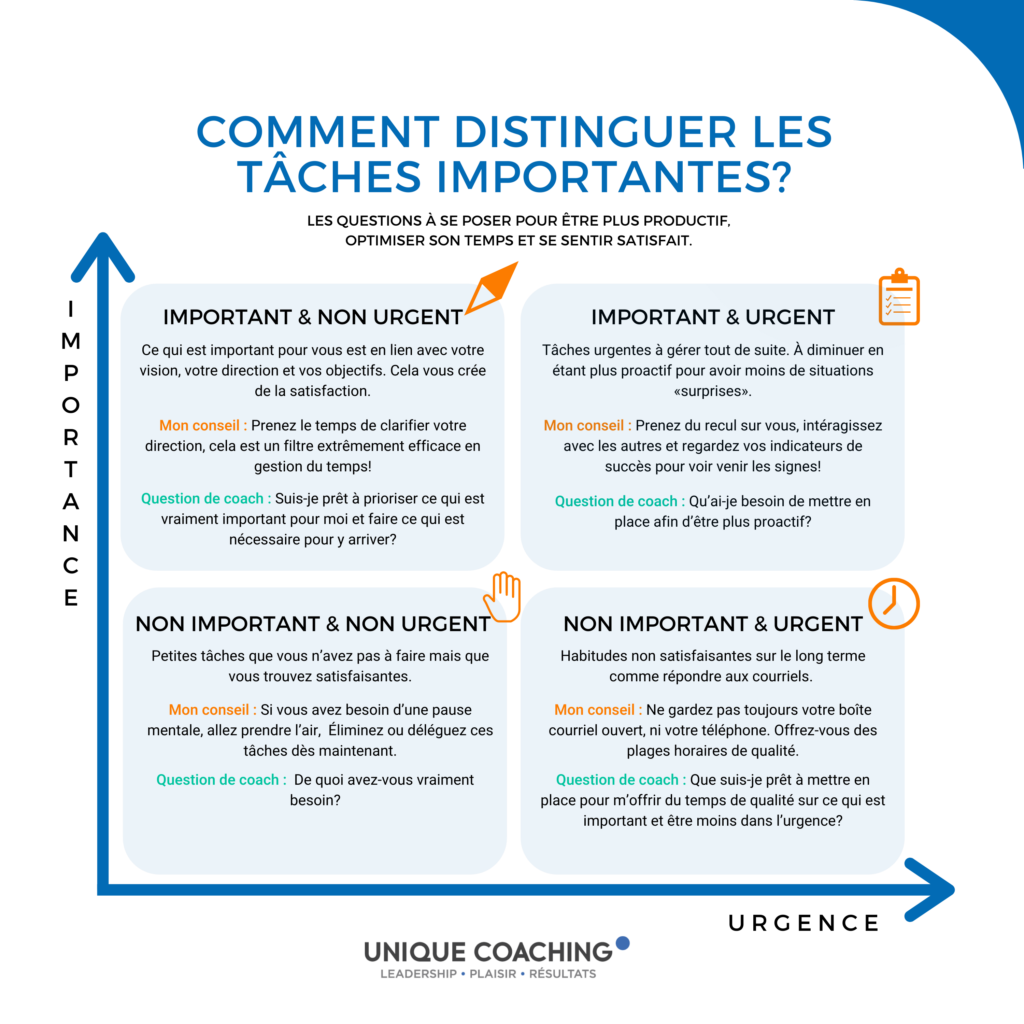Does being satisfied with your time management seem unattainable? Impossible? If you are in a management position, you know that without rigor stress easily appears… and your to-do list can go on indefinitely. By learning to distinguish what is really important, you will see a positive impact on you. Immediately.
This is what we will see in this article: how to distinguish what is important and to do versus what is urgent and propels you de facto into reaction mode.
The basic tool
The first thing you need to do to feel more satisfied, be more productive, and optimize your time is to ask yourself questions.
Trite? Not at all.
If you often find yourself in a whirlwind, know that you don’t ask yourself enough questions.
The questions you ask yourself control your focus.
Always know where you’re going, why you’re going, and how you’re getting there.
Coach Questions
Take a moment to look at your to-do list, agenda, and/or calendar.
-
- In which direction are you going?
- Why are you going in this direction?
- How clear and measurable are the steps to get to your direction?
Determine what’s important
In order to distinguish what is important, you may need to remember that:
1. You choose where you spend your time.
Yes. You are in control of your actions, decisions and attitude. If you give yourself obligations, you choose them too.
2. You may be used to superhero mode (superheroine!)
For many managers, emergency mode is a form of recognition. The one who resolves, who regulates, etc.
The superhero mode is satisfying until the day when… it is no longer so!
This emergency mode can also be a form of procrastination. Responding to emergencies is easier and no brainer compared to embarking on a substantive file and taking a step back.
If this speaks to you, you’ll love the Increasing Your Energy online training. I give examples and tools on exactly that: the superhero mode that I invite you to let go!
What is important is rarely urgent.
What is urgent is rarely important.
– D. D. Eisenhower
How do you distinguish what’s important?
The most important thing to remember is that what is important to you is going to create a sense of satisfaction and accomplishment in the long run. (You can make a connection to the intrinsic motivation of the last article.)
Here are 4 areas where you can place the elements. You are probably familiar with this Eisenhower matrix. What you place where is more important than what you do. That is, you can understand the tool, but it’s the quality of your choices in each watch face that will make a positive difference for you!
1.Not Important / Not Urgent
This area is used for distractions! These are the small tasks, that if you tell yourself the truth, you don’t have to do at all. But for some reason you find some satisfaction in it. It’s your comfort zone. Or something you don’t want to delegate. Or something that’s easy, and you really need ease once in a while! 😊
Do we understand each other?
My advice: if you need a mental break, take it in a healthier way. Go get some fresh air, talk to someone. Eliminate or delegate these tasks now.
Coach’s question
-
- What do you really need?
In my case, the answer is often: pause, distraction, ease. If it’s a break, I delegate the task or eliminate it, and then I go outside for some fresh air 😉 I know that staying to do this task won’t help increase my energy.
2.Urgent and not important
Rather, this area is used for habits that don’t really provide a sense of accomplishment in the long run. For example: answering emails/texts/phones right away.
Yes, your role may require you to be fast. Yes, you may be getting a lot of requests. Fast and volume do not require an immediate response. You are in control of how you use your time and energy.
My advice: don’t always keep your email open or your phone. Treat yourself to quality time slots, even if it’s just an hour or two. Even if it’s half a day a week.
Coach Questions
-
- What are the impacts of being in emergency mode on the things I really want to accomplish?
- What are the impacts on me?
- What do I really want?
- What am I willing to put in place to give myself quality time on what is important and to be less in a hurry?
3.Urgent and important
Here, you can find an emergency appointment with the dentist or a crisis with an employee that you have to manage right away.
The truth is that, more often, with more proactivity and focus on what is important, there are fewer and fewer emergencies in our lives.
If you visit your dentist 1 or 2 times a year, you will be in prevention mode and will considerably reduce the number of potential emergencies.
If you connect regularly with your employees, make the difficult conversations at the right time, coach your managers to increase the frequency of their interactions with their team, you will have fewer “surprise” situations.
In other words: proactivity = less urgency.
My advice: increase your frequency of connection to yourself (hindsight), to others (interactions) and to your results (indicators of success), to see the signs coming!
And… Stay alert to other people’s emergencies that impact your schedule 😉
Coach’s question
-
- What do I need to put in place in order to be more proactive?
4. Non-Urgent and Important
What is important to you is related to your vision, direction and goals. What is important to you creates joy, peace, satisfaction.
For example, it can be time:
-
- with your family
- on an important project
- to learn a key topic
- with the aim of developing a new skill
- to take care of your health and be filled with energy
- etc.
My advice: take the time to clarify your direction, this is an extremely effective filter in time management!
Coach Questions
-
- What is important to me?
- Am I ready to prioritize what’s really important to me and do what’s necessary to get there? This may involve choosing/prioritizing/eliminating/delegating/automating.
Conclusion
If you want more satisfaction in managing your time and distinguishing what is really important, start from your vision and make the choices that are in your area of control.
If you want to go a little further, measure your time. That is, take the time to write down everything you do, a week of that and you’ll have a lot of clarity on which areas need to be adjusted.
If you need help to take a step back, get professional coaching support.
Leave your questions, comments in… feedback!


